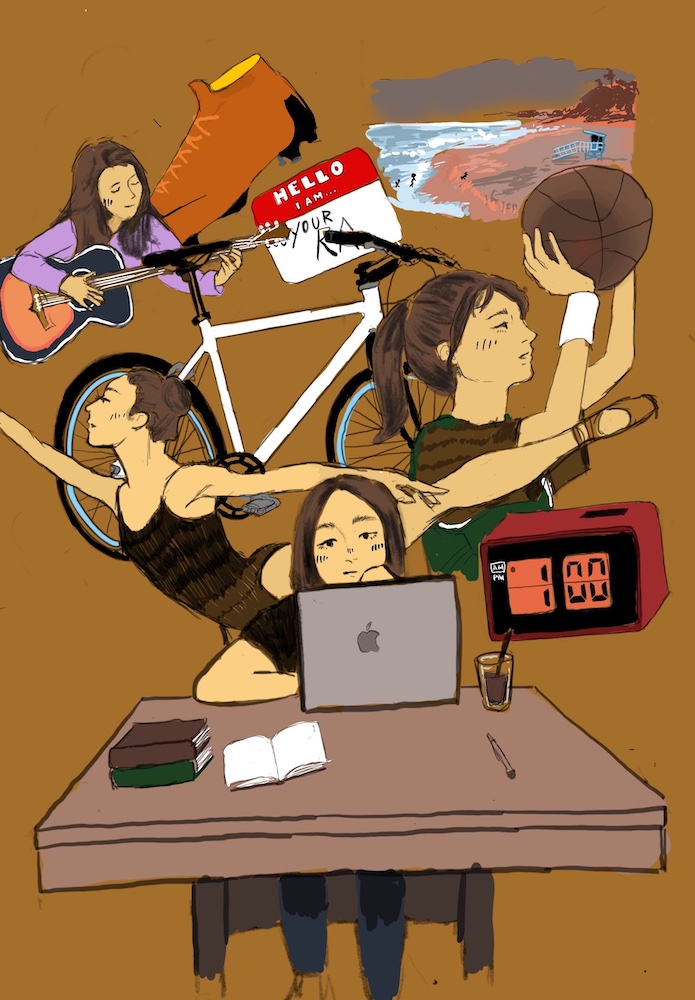In elementary school, my mom and I rushed from soccer game to basketball game to dance practice as I changed into my various uniforms in the backseat of our minivan every weekend. My ballet slippers, soccer cleats and basketball shoes were squeezed next to each other in my drawstring backpack. In middle school, I added softball to the roster and exchanged ballet for theater. In high school, the pattern repeated and I struggled to finish college applications because I was so caught up in my extracurriculars.
At 20 years old, not much has changed.
Complaining about how much work and activities I have is one of my favorite pastimes. I love my rants about how overbooked I am, my midterms and my persistent lack of sleep. At the end of all my speeches, I usually finish by blaming something or someone. I rotate between the structure of my jobs, my major, class schedules and expectations — assigning responsibility to everything but myself and my need to be busy.
Recently, my bad, busy habits have been catching up with me and preventing me from pursuing my interests. I haven’t had any time to practice guitar. I’ve hardly gone to the beach at all this semester. My room always seems to be a mess, left unattended for nearly the whole day. Under piles of books and stray clothes, I sometimes find old fliers and posters for events I forgot to prioritize. Sleep has been limited due to the homework that I typically start around 10 p.m.
My work addiction is obvious to everyone around me. My parents continually beg me to drop activities and my friends describe me, in an equally roasting and concerned way, as the “busiest person they know.” My three jobs partly comes from financial responsibilities and wanting to have disposable income as a college student in LA, but my other extracurriculars are more self-inflicted.
Part of my busyness comes from avoidance. In high school, I wanted to avoid problems at home so I did theater late into the evening. This semester, after going through a breakup during the first week of classes, I rearranged my schedule so that I worked most lunches. I refused to process hardships that came my way and threw work and responsibilities at my feelings.
But slowly, after years of burnout, I started to listen. In my senior year of high school, my mom recommended Jenny Odell’s book, “How to Do Nothing,” and a year later, it was gifted to me for Hanukkah.
It took me six months to finish reading it, but the book was not the corny self-help guide that I’d envisioned it to be. Instead, it offered the argument that the solution to our societal obsession with work and productivity cannot be solved by throwing out iPhones, the internet and labor altogether. We must create conscious time for rest or observation of things outside of work or technology.
“But beyond self-care and the ability to (really) listen, the practice of doing nothing has something broader to offer us: an antidote to the rhetoric of growth,” Odell writes. “Our very idea of productivity is premised on the idea of producing something new, whereas we do not tend to see maintenance and care as productive in the same way.”
It’s sad that I had to read an entire book to reach the conclusion that too much is too much and maintenance is as important as work. These epiphanies had always been bubbling at the surface of my mind. It was unfortunate that I only began to listen when I was suffering, but I am now distancing myself from many of my extracurriculars.
Those who are prone to busyness and overbooking must take steps back and consider where they stand on the cycle of work. We must ask ourselves if we have ample time to enjoy ourselves, and if we have given our bodies time to rest. However, many people do not have the luxury to stop working and are not in positions to cut back their hours or responsibilities. The advice to simply rest and put down whatever you’re working on does not encompass those who cannot afford to. Structures of capitalism make it unacceptable to put equal worth on maintenance and work. And when they are pit against each other, work wins.
As much as we are able to, we must practice self-maintenance and the act of just being. For those who are unable to cut back on their commitments, breaks may not be an option, but if possible, we can re-frame our thinking so busyness is not equated with fulfillment, and labor is not always equated with success.
Next semester, I am giving myself a break. As we head into finals season, I fantasize about my future nights off, the books I will read, the movies I will finally get around to watching and the life returning to my face. For the first time in my life I won’t be running around, changing in the backseat or sacrificing sleep for work. I’ll just be.
![]()































